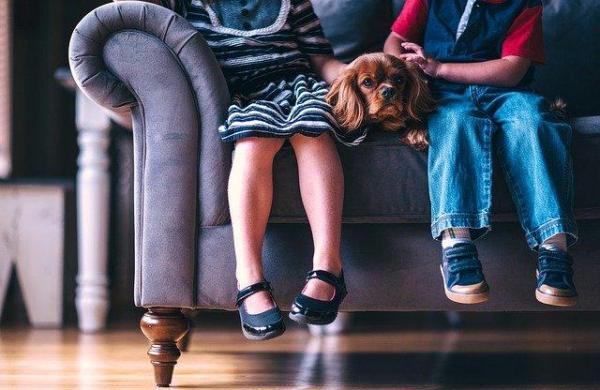Is Co-Owning a Dog a Good Idea?



See files for Dogs
With increasingly busy lives, the idea of dog co-ownership can seem like an appealing one to some. Although we may not want to decrease the affection we give to and receive from our dog, the responsibility of their care can be practically difficult to meet. By splitting their time between two guardians, the dog will receive the right level of care when one is unavailable. However, there are complications to this set-up. A lot of emotional, practical and even legal considerations need to be made.
At AnimalWised, we ask is co-owning a dog a good idea? We discuss the advantages and disadvantages of dog co-ownership to see if it is a possible option for you.
What is dog co-ownership?
At AnimalWised, we don't like to use the word ‘owner’ when it comes to animal guardianship. When we adopt an animal into our lives, they become a companion. They are an emotional creature with their own feelings and wants, something we need to consider when adopting a dog. They are not mere objects to be manipulated as we please.
However, there is an important reason why we use the term ownership and it is a legal one. Whether we adopt a dog from a shelter, buy them from a breeder or even rescue them from abandonment, we then need to register them. This shows authorities that the dog is ours and others cannot make a claim without having proof.
Although needing to confirm dog ownership is relatively unlikely to happen, it can be very important. For example, if you lose your dog and someone else rescues them, we will need to prove they are dog to bring them home again. The same if your dog is stolen, an occurrence which happens most often with purebred dogs.
This makes the concept of co-ownership a sometimes tricky one. If we live alone, adopting a dog in our name means we have ownership of the animal. If we live in a family with more than one person, the dog may be legally registered under one person's name, but the care and companionship is provided by the whole family. In this regard, although one person registered the dog, they are under co-ownership of the whole family.
Some people decide to have co-ownership of a dog by allowing them to live between two homes. In these cases, two friends can share the care of the dog by keeping them during alternate time periods. This could be days or even weeks. The organization will have to fit into a pre-arranged schedule, although this schedule may be subject to change depending on your arrangement.
Dog co-ownership from the dog's perspective
Dogs require companionship and are programmed to love their human guardians. We are their main reference point in their environment. They use us to both know what to do and to feel safe doing it. We provide them shelter, take them for walks, feed them and provide them with affection. They depend on us for their livelihood.
However, not all dogs are the same. Some will be more or less independent than others. This is due to many factors, including breed, socialization and life experiences. Some may also form close bonds with one person, but be reticent with others. Generally, all dogs tend to form a very strong attachment to one person. This is the person who feeds, brushes, walks and spends their time with them. This doesn't mean they won't be perfectly fine with others, but this does happen with some dogs.
Dogs are also animals of routine. They need to be cared for according to their specific requirements, but they all need security and stability. Again, this will depend on the individual. Some dogs can live in a hectic household and have a happy life. Others need more rigidity otherwise they can become anxious or insecure. With co-ownership, the dog can find it difficult to move between two places if they require more stability than others.
There may be differences in the way two people care for an animal. Even if they are not abusive, some dog guardians can provide insufficient care by not spending enough time with them or simply having a personality not well-suited to dogs. In some cases, the dog may simply prefer how one of the owners takes care of them, leading to them being stressed when with the other.
The homes in which two people reside might also appeal more or less to the dog. For example, if one person has a garden and the other doesn't, they might be much less happy in one home when compared to the other.

Who is the legal owner of a dog?
The legality of dog ownership will depend on the area in which you live. Many countries now require dog registration by law, but not all do. Some also make it illegal not to microchip your dog or register them with a veterinary surgery. It is important to register your dog, not only in terms of determining ownership, but also in case they become lost.
Part of the problem with co-ownership of a dog is that only one person is usually allowed to register the dog in their name. For example, even though there is a family dog, only one person will take them for registration and they legally belong to said person.
If there is a dispute in ownership of a dog, legal experts will use the following to determine to whom they belong:
- Registration: registration for a dog license allows the person the legal right to ownership of the dog. This means they are responsible for their care and, to a certain degree, their actions.
- Veterinary records: from the time they are a puppy, dogs will need to be taken to a veterinarian for vaccinations, deworming and general checkups. The veterinary clinic will register the dog with the owner. Usually this is only one person, but it is possible to have more than one name recorded on veterinary records.
- Microchip: as stated above, some regions make microchipping a dog mandatory. This involves inserting a microchip into the skin of the animal which can be scanned with a special electronic reader. The microchip will register the information of the owner, something which usually only happens with one person.
- Kennel club registry: for pedigree dogs which want to enter dog shows and competitions, registration with a kennel club is required. This can allow for one dog to be registered under two names.
When ownership of a dog is contested in court, the judge will look for the above information in proving ownership. This doesn't always mean the guardian who is best for the dog will be considered the owner, something which needs to be considered with co-ownership of a dog.

Pros of dog co-ownership
If you think that co-owning a dog might be a good idea for you, here are some of the positives:
- Diverse experiences: many dogs love having a sense of diversity in their lives. They love to explore new areas and meet new people. Living in two homes can help them to avoid boredom and provide more opportunities for new experiences.
- Shared responsibility: for the dog owners, having a dog all the time can be difficult with our work schedules and other responsibilities. If we share the care of a dog with someone else, it means we can enjoy the companionship of a dog with more freedom when we are not together.
- Shared cost: there are various expenses required when caring for a dog. Co-ownership allows you to split the costs according to the agreement with your co-owner.
- Travel: if you need to take a break or travel somewhere, you can leave the dog with your co-owner. This saves money on boarding kennels and ensures they are well looked after.
Cons of dog co-ownership
Unfortunately, there are negative aspects of dog co-ownership. We have touched upon some of them above, but here are the disadvantages of canine co-ownership:
- Attachment: if your dog is attached to one person more than the other, it can lead to them feeling sadness or anxiety when not with them. As we stated above, this will vary according to each dog, but it those with attachment issues might feel anxiety each time they change hands.
- Care differences: if the two people care for the dog in different ways (not even being bad in their own right), it can cause the dog problems. They may expect a certain type of care and become frustrated when they don't receive it.
- Routine changes: if the two co-owners have different routines, this can cause serious upset for the dog. For example, if one works nights and the other works days, it is likely untenable for the dog.
- Arguments: although you might be best friends with the person at the beginning, relationships change and it is possible you will argue due to the responsibility required. For example, if one person doesn't meet the care needs, it will cause frustration with the other.
- Relationship breakdown: if the arguments become chronic or there is a falling out, this leaves a big problem. Knowing who will look after the dog can create issues which are very stressful for all involved, especially the dog.

Who gets the dog in case of relationship breakdown?
There are many reasons why the co-ownership will no longer work. Not all are bad. For example, one person might get a new job and have to move. This can lead to the other person wanting to maintain the dog's care indefinitely. However, it can lead to a heated argument over who gets the care.
Many factors influence the result of these arguments. The nature of your relationship with your co-owner is an important one. If you begin co-ownership with someone you don't know well, then it is definitely a bad idea. There are two many variables and the result will likely be trouble for all involved.
Even when we do know the person well, it can be problematic. Perhaps the best example of this is when we are co-owning a dog with a romantic partner. If the relationship ends it can raise issues, especially if it is a divorce. This is because divorce can be contested in a court of law, especially in relation to disputes of ownership. In this sense, the dog will go to the person who has official ownership (see above).
When the other co-owner believes they should retain the care of the dog, it may be difficult to do from a legal standpoint. The last thing the dog will need is to be a bartering chip after the breakdown of a marriage.
In disputes over the guardianship of a dog, the only option you should choose is that which is best for the dog. Let them stay in the place best suited to them (often this is their original home) with the person who can best care for them. In most cases, there will be greater attachment to one person rather than the other. However, even if the dog is more attached to them, they shouldn't stay with them if they are unable to meet the responsibility of their care.
If you want to read similar articles to Is Co-Owning a Dog a Good Idea?, we recommend you visit our What you need to know category.
- Fogle, B. (1995). The Encyclopedia of the Dog. London. Dorling Kindersley.
- Morris, D. (1988). Observe Your Dog. Barcelona. Janés Square.









